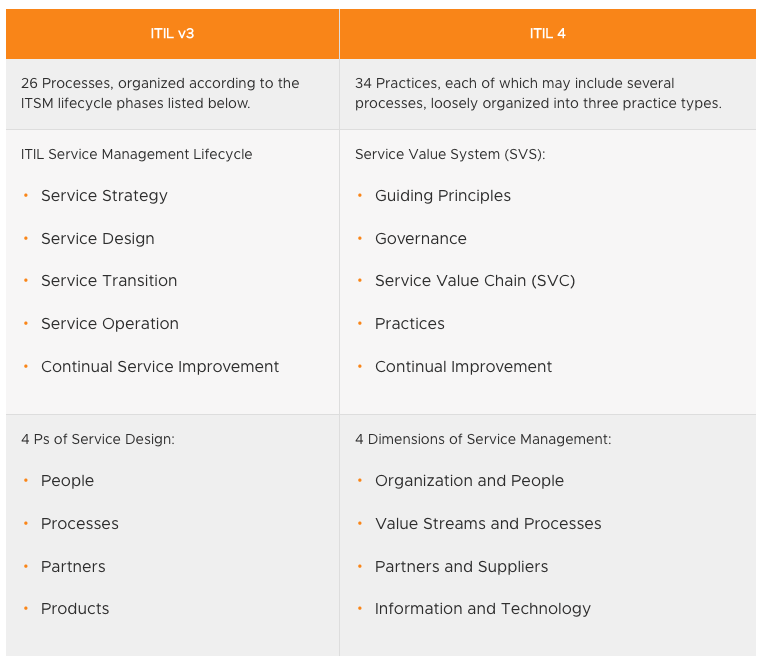OUR SERVICES
Technology can be complicated, which is why we help make it simple for you.
ITIL CONSULTANCY SERVICES
What started as a collection of good practices to better manage IT organizations and serve IT customers in the 1980s has evolved into a know-how used by more than 90% of Fortune500 organizations with more than two million ITIL certified IT professionals. ITIL continues to change with the rapid pace of change in developing technologies and customer needs. “ITIL is becoming increasingly important to enable Cloud and Big Data strategies,” said a recent AXELOS study. The FORBES Insights: State of ITSM 2017 report also highlights the value of ITIL, with 88% of IT executives saying ITSM is important to their digital transformation efforts. As a result, ITIL continues to have the best usage practice of all time.
How is ITIL 4 Different from ITIL 2011?
ITIL 4 is an evolution of ITIL v3 concepts, not a replacement. Good practices from previous versions of ITIL still apply; however, ITIL 4 publications have been updated to include additional modern practices and approaches to delivering valuable products and services to customers.

In addition to the above, ITIL 4 introduces the following new concepts, which we’ll dig into in further detail below: Service Value Chain Value Co-Creation Service Relationship Model Value, Outcomes, Costs, and Risks (VOCR) Value Streams ITIL’s Guiding Principles (updated from the ITIL Practitioner publication, released in 2016) General Management Practices (which include the following new ITIL practices: Architecture Management, Measurement and Reporting, Organizational Change Management, Project Management, Risk Management, and Workforce and Talent Management) Technical Management Practices (which include the following new ITIL practices: Infrastructure and Platform Management and Software Development and Management) ITIL 4 also includes details on modern and emerging technologies like cloud computing, infrastructure as a service (IaaS), neural networks, natural language processing, machine learning, blockchain, etc. and weaves in concepts from Lean, Agile, Scrum, DevOps, and other modern ways of working. The topics included here will be further detailed in the following sections.
ISO 27001 INFORMATION SECURITY CONSULTANCY SERVICES
ISO 27001 Implementation
ISO 27001 Internal Audit
ISO 27001 Trainings (Implementation, Awareness, Lead Auditor, Internal Auditor)
Cyber Security Audits (for Suppliers)
ISO 22301 BUSINESS CONTINUITY CONSULTANCY SERVICES
Safeguard your organisation’s future with business continuity management
Business continuity – planning for, protecting against and ensuring recovery from disruptive events – is more important than ever.
In an increasingly volatile world – exemplified by the COVID-19 pandemic – organisations are looking at business continuity from a fresh perspective. The illusion of business as a rampart against which the waves of the world break harmlessly is shattered; it is no longer possible to pretend that an organisation can weather all storms equally, or that the limited contingencies organisations develop are sufficient to protect them.
As a result, more and more organisations are looking to ISO 22301 – the international standard that defines the requirements for a BCMS – to safeguard their future.
ISO 22301 Implementation
ISO 22301 Internal Audit
ISO 22301 Trainings (Implementation, Awareness, Lead Auditor, Internal Auditor)



